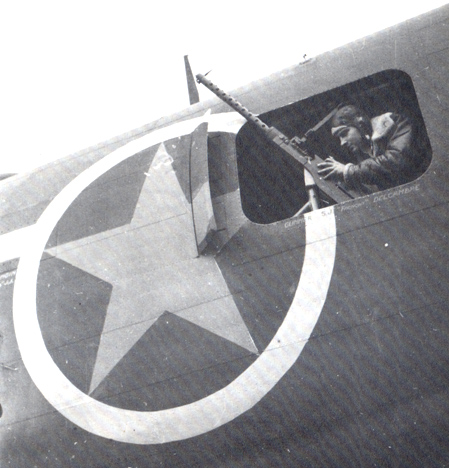Waist Gunner

In his book Jaws Over Europe, Ursell Harvell states:
"The two Waist Gunners on the bomber crew accounted for more enemy fighters than any of the other gun positions."
In the book The Cold Blue Sky, A B-17 Gunner in World War Two, Jack Novey tells of the speed at which German fighter planes closed on the bomber formations from above or from the nose. By the time they were within range of the waist gun, they went by fast. The waist gun was effective in protecting other aircraft when flying in formation but kills were difficult to confirm.
I asked Don Pierce about his experience at the waist gun in "Ole Irish".
His humble response:
The turret and the belly could get a shot at 'em too so unless they came right up beside you and you could see 'em hit and watch them all the way to the ground, you couldn't really say."
"I made a lot of noise. I saw some go down but I don't know if I really ever hit anything."
Bill Robertie, gunner with the 68th Bomb Squadron, said:
"There were good and bad things about being a waist gunner in a B-24. The good things were that you could move around and weren't cramped up like the turret gunners; you had a better view of the outside world than anyone else in the plane; and with those big waist windows and the nearby floor hatch you had a better chance of escape if it ever came to baling out in a hurry. The bad things were having to stand over your gun for hours; the cold and breeze; and being bucked around by any sudden changes in flight attitude the pilots made.
There was a slipstream deflector at the forward end of each waist window which could be swung out to keep out the worst of the blast but it was still pretty breezy at the gun.
The point-fifty wasn't difficult to manipulate but the kick made accurate aim difficult. If I'm honest I'd say that you just pointed the gun in the direction of the target and hoped. Any enemy planes shot down by waist gunners were more by luck than skill and I think most men would go along with that." *
Although some on the ground were envious of the "easy duty" and the higher pay the flight crews got, B-24 pilot George McGovern concluded that
.. all of them, but most of all the gunners, "were entitled to every dollar they got in pay and every decoration they got and they were entitled to more praise than they got from me."**

* from the book B-24 Liberator at War by Roger Freeman
**from the book Wild Blue by Stephen E. Ambrose